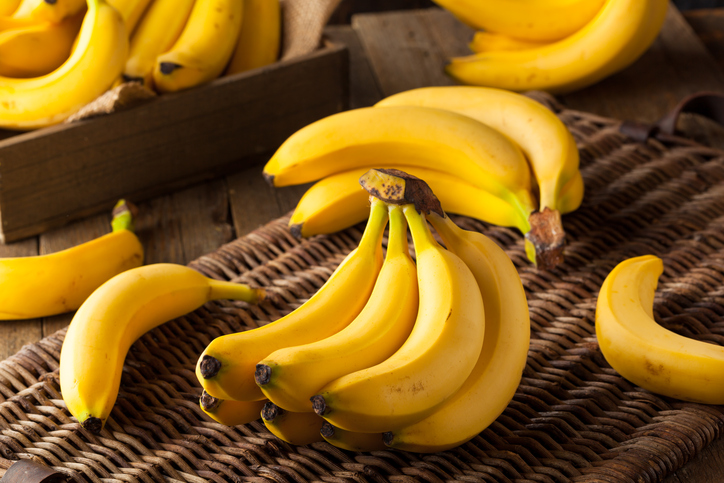Are Bananas Good For You? See the Video

How many times have you heard, “Bananas lead to weight gain,” or, “Bananas are one of the worst foods you can eat when you’re trying to lose weight”? Surely you’ve seen that poorly drawn picture of a banana that says, “NEVER eat this for a flat belly” countless times.
Does this polarizing fruit, which was introduced to the Western world by Alexander the Great around 300 BC, really deserve the bashing? Are bananas good for you? Can bananas have devastating effects on your waistline? Yikes! I sure hope not—I just ate one…but wait until I tell you when I ate it.
What do bananas really do to your body?
What’s in a banana?
A medium banana contains 105 calories, it’s virtually fat-free (about ½ gram per banana), and it contains about 1 gram of protein. In other words, bananas are basically all carbohydrates. Indeed, a medium ripe banana contains 27 grams of carbs, about 14 of which are sugar.
And it’s this noteworthy fact, my friend, that seems to be why bananas get a bad rap.
How many times have you heard the (relatively unhelpful) nutrition advice to “avoid too much sugar”? There’s no question that most people will be better off by limiting their intake of sugary foods. When eaten in excess, added sugars can contribute to fat gain, diabetes, cardiovascular disease, and a host of undesired health issues.
Seriously, though, does a banana really fit into the same category as sugar-sweetened beverages (like soda, fruit juice, and fruit-flavored drinks), sugar, candy, cakes, cookies, muffins, pies, desserts, sweetened yogurt, ice cream, pastries, ready-to-eat cereals, granola bars, sauces, dressings, and on down the list of processed junk foods?
Consider the following. It’s estimated that the average American consumes over 150 POUNDS of sugar per year. That equates to about 3 pounds (or 6 cups) per week, or over 42 TEASPOONS PER DAY. I know that’s a lot of math, but bear with me…
Considering there are 4 grams of sugar in a teaspoon, that means the average American is consuming over 160 grams of sugar PER DAY. Contrast that with the 14 grams of sugar in a banana, and I think you can start to see my point.
Bananas are not the problem.
In fact, if you’re eating an otherwise healthy diet, it is unlikely—highly unlikely—that consuming a banana every once in a while (heck, even once a day) is going make you fat or even hold you back from losing weight. If you have a problem eating too much sugar, it’s much more likely there are other “probable suspects” (like those listed above). Unless, of course, you’re eating a dozen bananas per day. 🙂

Are Bananas Good For You?
Unlike processed foods made with added sugar, there’s much more to bananas than you might recognize. For starters, ripe bananas contain 3 grams of fiber, which promotes a healthy digestive tract, increases satiety, reduces appetite, promotes regularity, improves glycemic control, and enhances weight loss.
What you may not know is that bananas contain two more very special types of fiber, called FOS and resistant starch, which are both PREbiotics, meaning they help support a healthy balance of friendly gut bacteria. Even more important to note is that resistant starch is found only in unripe green bananas.
Resistant starch helps increase fat burning, decrease fat storage, improve insulin sensitivity, suppress appetite, and not surprisingly, reduce body fat. Sounds pretty awesome, right? I agree, and that’s why I personally eat mostly green bananas. That’s also what I’d suggest if you’re trying to lose fat or if you’re the type of person who packs on pounds just looking at carbs.
Since the ripening process dramatically reduces the amount of resistant starch and increases the amount of sugar, when you eat ripe bananas may be important. I mentioned that I just ate a banana, and it was a ripe one. Why? I just finished an intense workout of weight lifting and sprinting. My body had burned off a bunch of carbs (called glycogen) to fuel my exercise, and since muscles are like sponges after exercise—it was the perfect time to get some easy-digesting carbs and sugars, which will be stored as energy, not fat.
Other good times to eat ripe bananas are at your first meal of the day (when insulin sensitivity is highest) and a couple hours before exercise (when you can burn off the carbs to fuel your workout).
What else is in a banana?
Knock, knock. Who’s there? Banana. Banana who? Knock, knock. Who’s there? Banana. Banana who? Knock, knock. Who’s there? Orange. Orange who? Orange you glad I didn’t say banana?
I thought you might want to share that joke with your child or grandkid. I always got a kick out of it with my Pop-Pop.
Back to the topic at hand, there’s even more to the banana. For instance, most people have heard that bananas are a good source of potassium, which is essential for maintaining normal blood pressure and promoting heart health. (Truth is, there are many other foods, like dark green, leafy veggies, zucchini, potatoes, and avocados, that are better sources of potassium.)
What most people don’t know, however, is that bananas are a rich source of antioxidants. In fact, bananas have a higher antioxidant capacity than some berries, herbs, and veggies. Surprising, I know. Antioxidants help combat excessive oxidative stress, which accelerates aging on virtually every level—your skin, joints, brain, and more. Yep, that’s right, bananas have anti-aging properties.
Another little-known fact about bananas is they contain melatonin. Yes, that’s the same hormone your body produces that helps regulate circadian rhythms and facilitates sleep. Bananas also contain tryptophan, which can help you feel more sleepy and improve your quality of sleep. Ideally, melatonin levels are highest at nighttime, so maybe a banana (particularly a green banana) as a pre-bed snack isn’t such a bad idea.
That’s a wrap (or peel)
So the next time you hear “Are bananas good for you?”, you can respond with a resounding yes.
Now that you think about it, doesn’t it seem a little silly that someone would say you should never eat bananas when you’re trying to lose weight? I think so. Alexander the Great thinks so.
But I also think it may be a good idea to eat unripe green bananas, especially if you’re looking to drop weight or if you’re one of those unlucky ones who gains weight merely by looking at carbs. I also think when you eat ripe bananas may make a difference, and eating them around exercise or at your first meal of the day may be best.







